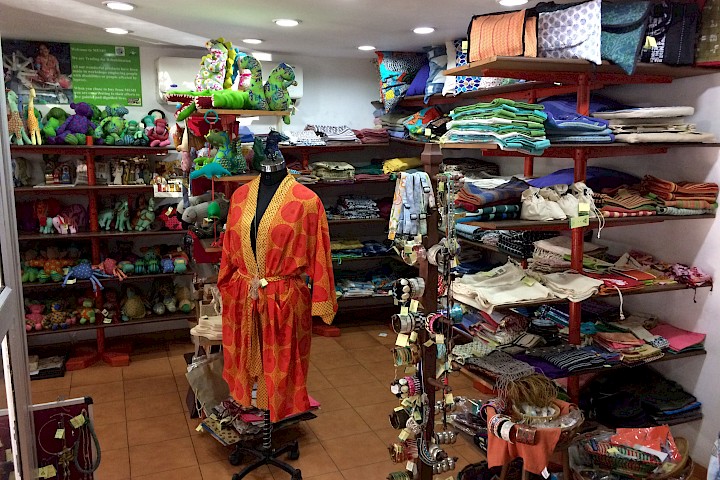
Interview with Roopa Mehta, president of WFTO
Fair Trade is a viable solution to the global problems of our time.
WELTLADEN: Why did you found Sasha?
Mehta: We founded Sasha to provide employment opportunities for artisans in rural areas. Our goal is to empower artisans to run their own businesses. To fulfil this goal, we combine the rich tradition of Indian crafts and textile making with modern designs. When tradition and design come together you can create products which are unique but can be used every day by everyone around the world.
WELTLADEN: Since 2019 you have been president of WFTO. What does it feel like to lead such a huge international organization?
Mehta: I am very proud to be the president of such a strong organization. But I also feel the huge responsibility that comes with this position: We at WFTO must come up with strategic plans to address the needs of our members. Facilitating market access, creating opportunities for capacity building, learning and networking
Ultimately, we are working towards making the Fair Trade movement more relevant and also more accessible to people. We are driven by the question of how we can play a bigger role in advocating and promoting Fair Trade. That is a big agenda.
But I am glad, that there are very strong people amongst the WFTO Board and membership who help me carry my responsibilities. I hope I am doing justice to what I am expected to do.
WELTLADEN: How did the corona/Covid-19 crisis impact Fair Trade producers around the globe?
Mehta: It is a very difficult situation and producers had to face many challenges. But it has been a very interesting, engaging and moving experience to see how much solidarity there is within the movement. Our partners did not cancel orders, instead they raised money to support the artisans in some way or the other. That was a direct relief and very helpful during the first phase of the crisis.
Now we are in the next phase of dealing with this crisis, which means providing further market linkages and building capacity by organizing webinars on ecommerce etc. WFTO social media and websites updated the members page and provided potential buyers to link to our members through a product search. Many members are onboarding on ecommerce platforms and WFTO is supporting these efforts. Artisans everywhere are now gaining experience in photographing their products and understanding the language of online marketing. Because of their contribution organizations like Sasha can continue promoting their work, by creating online market spaces, where people can buy directly from the artisans.
Another effect of this crisis is, that people recognize the value of the work we are doing. Because of social media, people are beginning to see the stories of inequity, discrimination and environmental destruction. Many people start realizing, what greed has done to the planet. I hope it will resonate even more with people with the result that they will choose to buy Fair Trade products more often.
WELTLADEN: What can producers, Fair Trade organizations or politicians do to make sure that Fair Trade will continue to grow in the future?
Mehta: This answer requires different perspectives. The producers’ duty is to maintain the Fair Trade principles in their work environment.
The organizations working with producers have to assure the livelihood of their members. At the same time, they have to get the messages of the Fair Trade movement out to people. Engaging not only the converted, but also engaging a larger community of people and build up their customer base by sharing stories.
For politicians, governments, and policy makers it is important to think further than their national borders. We are dealing with global issues here, so governments must understand, that the state of the people and our planet is not confined to singular territories anymore. Anything that happens in one part of the world is going to impact the entire world. We need more from them than lip services, we need to see them taking action and creating a better future.
WELTLADEN: There are around 900 worldshops in Germany, selling Fair Trade products. What is the significance of those shops for producers in India and around the world?
Mehta: Sasha is a 42-years old organization, so we have seen the whole worldshop-movement grow over time. I would like to describe Worldshops as places, where all the dimensions of Fair Trade become visible for the costumers: beautiful products, education, and political work.
Our message is that Fair Trade is a very viable solution to several of the global problems which we are confronting today. Worldshops play a huge role in spreading this message. People at worldshops know their costumers, they can communicate with them directly and motivate them to become a part of the Fair Trade movement and spread the idea.
Worldshops are also important when it comes to political change. They are the basis of the global Fair Trade movement. They have the local and national networks to promote Fair Trade and to demand action from their government and politicians.
WELTLADEN: Is there a message you would like to get out to worldshop customers?
Mehta: Do support your worldshops. Become an ambassador for the Fair Trade idea and spread the word within your communities. I believe that Fair Trade is THE business model to transform the global economy into a fairer system. It offers solutions to the global problems of our time. Now we have to make sure that the conversation reaches a much larger community.
Interviewed by Svenja Lambert (Weltladen-Dachverband).
For more information visit sashaworld.com and wfto.com.

